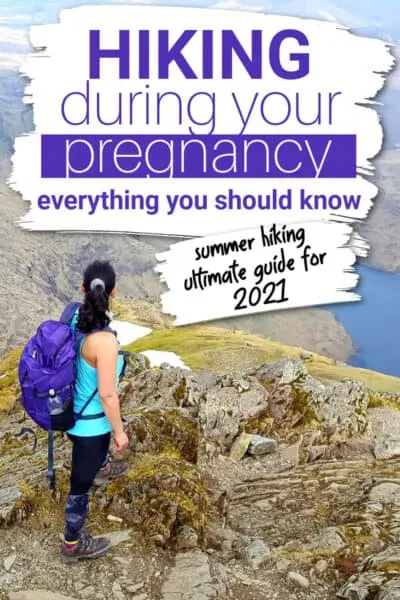Updated August 14, 2022

Are you wondering if hiking is safe during pregnancy?
First congratulations on your pregnancy and secondly you have come to the right place!
My better half is an OB/GYN, I’m an RN, and an avid trail runner and hiker.
Hiking is an excellent cardio workout, improves physical stamina, and can help improve your mood.
Hiking in moderation is considered a safe exercise during pregnancy. There are some steps you’ll need to take to make sure you and your growing baby stay safe.

First things first: talk to your doctor or midwife. Every pregnancy is different and everyone’s health history is different.
You want the “All clear.” from your provider because they know you and your health history best.
We have so many great tips to share for safe hiking during pregnancy and a list of the BEST pregnancy hiking essentials.
So let’s jump right in!
Is Hiking Safe During Pregnancy? – Pregnant hiking essentials:
If you are a regular hiker, you probably know all about the 10 essentials you should have with you on hikes.
They become even more important when you are pregnant.
1. Hiking shoes or hiking boots
You’ll want to get a comfy and grippy pair of hiking shoes or hiking boots. I wear trail running sneakers when hiking because I prefer a lighter feel on my feet and legs.
You may find hiking boots work better for you. They do offer more ankle stability and have deeper lugs that offer a better grip than trail running shoes.
Get the right size. Remember your feet can swell during pregnancy so you do not want them to be too snug.
Walk around the store wearing them. Pay close attention to how they fit.
Pro-Tip: Go try hiking boots or trail runners on at the end of the day.
If you feel any areas rubbing, don’t blow it off. Those will become agonizing blisters on a hike.
Take your time at the store. Most stores will only allow you to return unworn shoes.
I have sensitive spots on my feet that blister no matter what hiking shoes I wear. Prevention is key. I cover those areas with moleskin before they get a chance to blister and wear socks that do not slip.
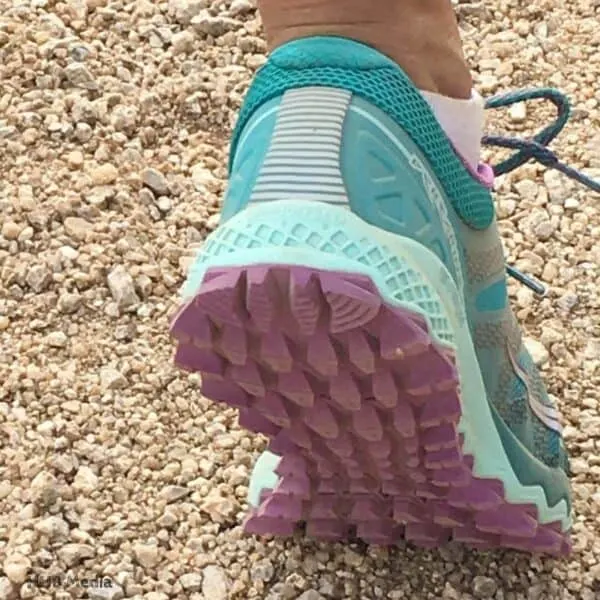
2. Wear a lightweight day pack and bring plenty of water.
Having the right daypack can make the difference between an enjoyable hike and a miserable hike. That is even more true during pregnancy.
Venture Pal 40L Lightweight Packable Waterproof Travel Hiking Backpack Daypack
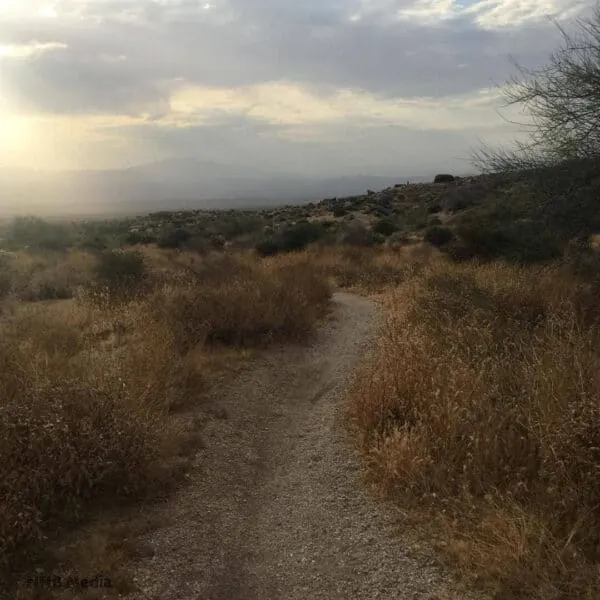
3. Snacks
Pack easy-to-eat snacks. Pick snacks that you know you like.
A hike is not the time to be trying new foods. you want to try to make sure that your snacks have a carbohydrate-protein and fat.
That will help keep your energy levels in your blood sugar stable.
When I go hiking I always tried to bring snacks that include protein and a carbohydrate.
I might bring a sandwich, yogurt and fruit, and hummus and carrot sticks.
One of the things I’ve noticed when hiking is that it’s not the uphill climb that gets to me, it’s the downhill slope.
I find that I get very hungry when coming down a mountain.
Coming down it’s always been more technically challenging for me. so keep in mind how you hike and plan your snacks accordingly.
Healthy hiking snacks during pregnancy:
- Whole-grain crackers with nut butter or peanut butter
- Dry whole-grain cereal
- Bagel and cream cheese
- Pretzels with nut butter or cheese
- Hummus and carrot sticks
- Granola bars
- Apple chips
- Whole apple
- Smashed Chickpea Salad Sandwich (link)
- Chicken Salad Sandwich
- Homemade Dried Fruit (link)
4. Pregnancy-safe Sunscreen
One of the questions women often ask “Is it OK to be in the sun when pregnant?”
Yes. It is OK as long as you take some precautions.
Pregnancy makes your skin more sensitive to the effects of the sun.
That means you can burn more easily.
Use sunscreen with SPF 30 or more, and wear a hat when hiking. You definitely want to wear half.
It’s not your imagination that your skins for your skin burn more easily during pregnancy. that includes the top of your head.
5. Trekking poles
Trekking poles are very helpful, especially when hiking over rough terrain.
Everyone should use trekking poles for support and prevent injury.
Trekking poles are particularly important if you are pregnant.
During pregnancy, the distribution of your weight changes, and the changes in your center of gravity can cause instability.
In addition, pregnancy causes your hip and pelvic joints to loosen and this can make it more difficult to maintain a stable posture, let alone hike up a mountain!
Trekking poles are especially helpful on the downhill part of your hike. When descending, it is easy to slide and lose your footing.
The poles can help you keep your balance and control your speed.
Get a pair of trekking poles that fold up. you can stuff them in your Daypack when you’re not using them.
6. Cell phone
Anyone (not only women who are pregnant) hiking into the woods or venturing into unfamiliar terrain, must carry a cell phone.
There are many ways a cell phone can literally save your life.
There are some areas throughout the country where there is no cellphone service. Check and make sure the place you go hiking has cellular access.
If not, there are likely other reasons you would want to avoid hiking in such an area.
A cell phone gives you access to emergency services. You could injure yourself while hiking.
Depending on where you are hiking, as we have mentioned, you might need urgent care if you are bitten by a snake or have a reaction to an insect bite.
The weather can change abruptly and you may need to let local authorities know where you are.
You could experience a problem relating to your pregnancy. While these scenarios are unlikely, it is important to be prepared.
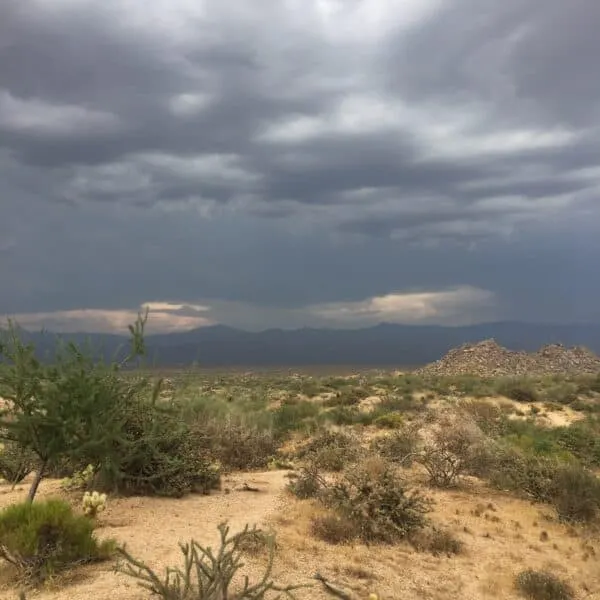
Anyone who uses their cell phone a lot knows the frustration of having your phone battery die. Having a full charge is not enough.
Fortunately, there are many power sources you can get to charge your phone.
For hiking, there are now power supplies that recharge using solar panels, though our experience has been they should only be considered an emergency back-up.
If you are taking a long hike and don’t want to worry about your charge running out, consider a Jackery Bolt power bank or solar power bank.
The Jackery Bolt only weighs 8 ounces and can give a phone 2 full charges.
I would also suggest if you are pregnant to not hike outside the range of your cell phone service.
If you have an emergency on the trail you want to be able to reach help quickly.
7. Small first aid kit
Bring a small first aid kit in your daypack. Minor scrapes and cuts can happen when hiking.
Washing a minor cut with an antiseptic and applying a topical antibiotic will help you avoid a serious infection.
You can easily put together your own small first aid kit or you can buy a pre-made first aid kit.
This is the first aid kit that I like to use.
It’s compact fits perfectly in my Daypack and has everything that I could need on the trail.
8. Toilet paper
Don’t forget toilet paper! Hiking during pregnancy means you’ll have to pee in the woods or in the brush off the trail, at least 100 times.
Maybe not 100 times, but a lot.
When you get to the trailhead if there’s a restroom make sure you use it before you head out.
You can check if the trailhead has a restroom on the all trails app which I’m going to talk about next.
9. All Trails App
All Trails is an app for hikers and trail runners. All Trails helps you find trails in your area, rates their difficulty level, can see pictures, and read reviews of trails.
You can check the topography of the trail. You can see the elevations on the trail.
It is always a good idea to check if there are any bodies of water that cross the trail.
10. Hand sanitizer
Using an effective hand sanitizer is a great way to avoid colds and flu.
It is also an easy way to clean your hands when hand-washing is not an option.
Viral transmission to others is a serious concern and the best way to prevent the spread of infection is to wash your hands.
11. Mask
Bring a facemask with you and wear it when you use the restroom at the trailhead.
12. Disinfectant Wipes:
Wipes are a must. You want to use them when you use the restroom at the trail.
Public restrooms can be places of transmission for the coronavirus and other bacteria and viruses.
When you’re pregnant you can be more susceptible to colds and flu and viruses. When you use the restroom make sure to wipe down the handle on the stall door.
Tips For Hiking Safe During Pregnancy
1. Invest in a good pair of hiking shoes.
Investment in a good pair of hiking shoes is priceless. I can’t tell you how many pairs of Trail runners hiking boots I went through when I first started hiking and trail running.
You can learn from my mistakes. I found out the hard way that spending the money on a well-fitted pair of shoes.
There is nothing worse then being 5 to 10 miles out from the trailhead realize if you are developing blisters.
The right socks are essential when hiking too.
Many people find that wool hiking socks work well because help keep your feet dry.
2. Staying well-hydrated is a must.
You need to stay hydrated during pregnancy and especially when exercising.
You should bring at least 4 liters of water with you if you are going on a medium to a long hike, especially if you will be hiking uphill.
You will drink more than you think you will.
I suggest at least 4 liters of water in case you have an emergency or get stuck out on a trail for some unforeseen reason.
3. Eat small frequent meals/snacks.
Small frequent meals will help keep your energy up and your blood sugar stable.
If you are suffering from morning sickness eating small meals can help relieve your nausea.
4. Slow down and avoid uneven trails.
Stick to more flat and less technical trails to make it less likely you will trip or fall.
This is more of an issue in your second and third trimester as your growing belly can throw off your center of gravity.
During your third trimester as your body prepares for birth, your joint and ligaments become looser which can impact your balance.
It is so easy to trip on a trail, to hike faster than we should, and not pay attention to every step we take.

Fatigue is a common problem during the first trimester of pregnancy and often returns during the third trimester.
I was very fatigued during my first trimester and had to slow down when doing outdoor activities.
If you are fatigued it is a good idea to slow down.
You want to slow down before you get exhausted and realize you have to hike back out.
Getting tired quickly is a frustrating end to a day of hiking your favorite trails.
5. Stay cool. Be careful to not overheat.
If you’re hiking in the summer or early fall choose trails that have some shade if possible.
You need to stay cool so think easy to remove layers, wear a hat and drink lots of water.
If you feel like you’re getting overheated: stop hiking, drink some cool water, try to find shade, and consider if it’s time to turn around and head back.
6. Watch out for snakes.
Watch out for snakes! Snakes like to hang out in the morning sun to warm up. It’s not unusual to come across a snake on the trail.
Move away from the snake. In most cases, the snake will slither off into the brush on the side of the trail. They are more afraid of us than we are of them.
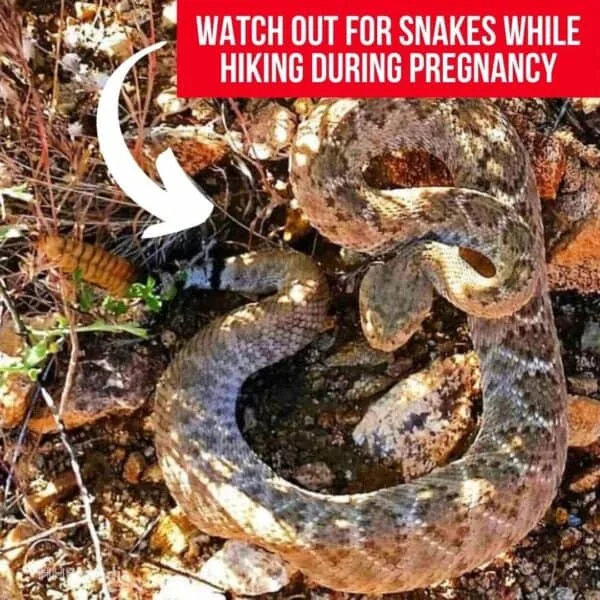
7. Take breaks
You are growing a little human so take breaks as often as you need to.
Don’t feel bad about needing to rest.
Taking frequent breaks can help you hike further and for longer periods of time.
8. Use hiking poles
So tracking polls as we talked about earlier are going to be your best friend for hiking during pregnancy.
If I had one piece of advice that I could give as a trail runner and hiker it would be to use hiking poles right from the beginning of your pregnancy.
The reason is during your first trimester you can have fatigue and energy issues.
I found that using trekking poles made hiking easier and I didn’t feel like my energy was depleted as fast.
I was able to hike longer and further.
When you get into your second and third-trimester hiking poles are important for helping you maintain your balance. It can be easier to trip and fall and you don’t wanna do that so hiking poles are in Dragon bowl.
Hiking with trekking poles allows you to handle more technical trails as your belly grows.
9. Watch your elevation
The elevation is going to be relative to where you live.
Most pregnant women should stay below 8,000 feet.
If If you live at 8000 feet or above or you’re an experienced hiker you may feel comfortable hiking above 12,000 – 14,000 feet and that’s fine.
Be sure you run that by your doctor or midwife.
10. Hike with friends or family.
It is important to hike with family or friends during pregnancy, especially in your second or third trimester.
Hike with people who will go at your pace and will take breaks when you need too.
11. Wear a maternity belt.
The maternity support belt is on my list of must-haves for hikes.
12. Be gentle with yourself if you are fatigued after a short hike.
Be gentle with yourself. Don’t get down on yourself if you feel fatigued and you have to turn back on a hike.
Take it slow stay hydrated and if you find that you are very tired on your hikes then what you can do is what I would do is save my hikes for the weekend.
I would make sure that I had a good meal on Friday night.
I would go to bed early and then we would go hike on Saturday and Sunday that worked a lot better for me then try to hike during the week after work I was just too tired.
13. Bring your cell phone
It’s really important during pregnancy and when you’re hiking to always have your cell phone on you and to stay in an area where you have cell phone service.
I know that you can use a personal locator beacon, but if you are having a problem on the trail and you’re pregnant it’s probably going to be faster if you have cell service and you can call for help from your cell phone.
14. Avoid steep inclines
If you’re a new hiker you’re probably already going to be doing this anyway.
With your growing belly, your center of gravity is going to be off and it is much easier to lose your footing and you could slip and fall.
15. Keep an index card of your up-to-date pregnancy info in your Pack.
At all times, prenatal patients should maintain and carry on them, the basic information about their prenatal course. A healthcare provider needs to know this information to make the best medical decisions.
-Dr.Doug Penta, MD/OB/GYN
This is so important and it’s something that Doug and I very rarely see anybody talk about:
You should always keep an index card on you that has details about your pregnancy.
If something happens on the trail and you have to go to a hospital, you’ll see a doctor who doesn’t know you or know your pregnancy history
What should I put on my index card about my pregnancy?
You want to include your prenatal lab results recorded after your first prenatal visit.
Here are some of the details you will want to have available from your prenatal record:
- your prenatal lab results were recorded after your first prenatal visit
- your last blood pressure at your prenatal visit if you are experiencing high blood pressure during pregnancy
- your fasting and two-hour blood sugar results if you have gestational diabetes.
- if you have protein in your urine
How far can you hike when pregnant?
How far you can and should hike during pregnancy is going to depend on how you feel, how far you were hiking before pregnancy, and what trimester of pregnancy you are in.
One of the biggest surprises I had during pregnancy was how tired I was in the first trimester.
I would come home from work and I would just want to collapse on the couch. I had no energy or desire to get outside and be active.
If you find during your first trimester that you are really tired, adjust your expectations, and take a nap.
You are growing a human. Give yourself a break.
It can feel frustrating when you find you can’t do the things you used to do quite as easily.
Plan your hiking trips for the weekends when you are likely to have more energy.
Get a good night’s sleep before your hike.

Many women find that in the first trimester they don’t have any problems with how far they can hike.
So if you’ve been hiking 10 miles, and you feel OK, you can still hike 10 miles.
If you’re still a relatively new hiker, it probably isn’t a good idea to start hiking long distances.
You will want to hike the distance you are comfortable with.
You may find that as you get into your second and third trimester you have to cut back on the number of miles you hike and the incline that you hike.
It is very easy to become extremely fatigued hiking up steep inclines during your third trimester especially.
Trekking poles can help. They are good to use to help you maintain your balance and you can shift some weight to them to make hiking uphill easier.
What hiking elevation is dangerous for pregnancy?
Hiking during pregnancy is an excellent form of exercise. As with any sport, when considering the extreme version of a particular sport, pregnancy-related safety concerns often will factor in.
You should keep your hikes to an elevation of about 8,000 feet or less.
This is because hiking at high altitudes can cause less oxygen to circulate in your blood and could cause your baby’s oxygen levels to decrease.
Hiking mountains while pregnant
You can hike mountains if you are an experienced hiker and have cleared it with your provider.
Even experienced hikers will need to cut back as their pregnancy progresses. It is normal. Don’t feel bad.
Make sure you have all your essentials, hike with someone, watch your elevation, energy levels, and use as many of our tips above as needed to make your mountain hike as safe and enjoyable as possible!
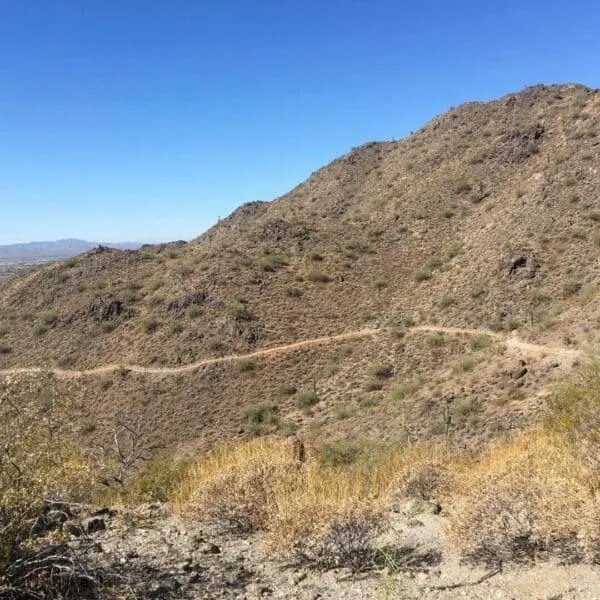
The Benefits Of Hiking While Pregnant:
Hiking is a beneficial activity during pregnancy:
- You get outside in nature, which has been shown to reduce stress levels.
- Hiking helps strengthen your leg muscles and increase your physical stamina both of which can make your third trimester and labor easier.
- Physical activity during pregnancy is good for both you and your baby. Exercise has been shown to decrease both labor and delivery easier.
- Exercise has been shown to improve mood.
- Can improve your pregnancy sleep
- Helps you maintain a healthy weight during your pregnancy
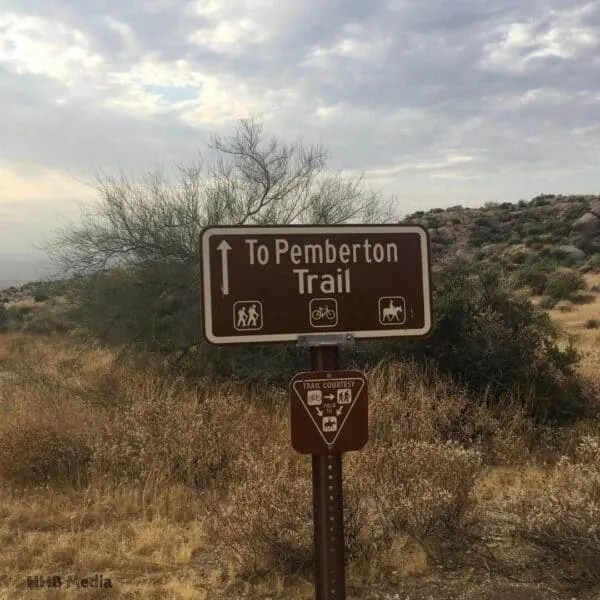
Conclusion:
Hiking is an excellent cardio workout, improves physical stamina, and can help improve your mood.
Hiking in moderation is considered a safe exercise during pregnancy.
Make sure you are wearing comfortable hiking shoes, and have plenty of water, snacks, and your cell phone.
Bring your hiking essentials, hike with someone, watch your elevation, and energy levels, and use as many of our tips above as needed to make your mountain hike as safe and enjoyable as possible!

